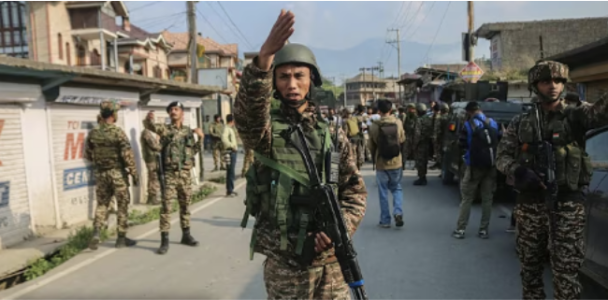India–Pakistan tensions escalate after Kashmir attack: Fears of nuclear conflict resurface
- Replies 0
In a world already grappling with instability, a deeply alarming crisis is escalating in South Asia.
Tensions between nuclear-armed rivals India and Pakistan have soared following a deadly militant attack in Kashmir and subsequent military strikes, raising concerns among global leaders and security experts.
Could the world be facing its most dangerous nuclear standoff in decades?
In retaliation, India launched strikes—using long-range weapons—on what it called "terrorist camps" in Pakistan and Pakistan-administered Kashmir.
Pakistan claims at least 31 civilians were killed, including women and children, and denounced the action as an "act of war." While India disputes the figures, independent verification is limited.

The violence escalated with artillery and mortar fire across the Line of Control (LoC), the de facto border, leaving civilians dead on both sides. Families have begun fleeing border areas, terrified of further attacks.
India responded by briefing foreign diplomats that "if Pakistan responds, India will respond," fueling fears of rapid military escalation.
While India maintains a no-first-use nuclear policy, Pakistan's position remains deliberately ambiguous.
This latest crisis illustrates just how dangerous the Kashmir conflict remains. With a large number of people living in the region and both nations armed with nuclear weapons, any war risks a global catastrophe.
Pakistan’s economy, already fragile, could collapse. India, a rising global power with deep ties to the West, faces mounting international pressure to de-escalate.
Yet, diplomatic efforts are struggling to keep up with fast-moving developments on the ground, including airstrikes, troop deployments, and artillery fire.
Former UK Prime Minister Rishi Sunak supported India's right to strike terrorist infrastructure, while Pakistan accused India of targeting civilians and vowed further retaliation.
History shows backchannel diplomacy, global pressure, and restraint have defused crises before. But this time, both governments face domestic political pressure and nationalist sentiment, making de-escalation harder.
India has claimed evidence of further planned attacks by Pakistan-based groups. Pakistan has rejected these claims and vowed robust retaliation. With both nations trading fire and rhetoric, the situation remains highly volatile.
Read next:

Do you remember tense moments in global history or have personal ties to regions facing conflict today? How are you feeling about recent events? Share your thoughts in the comments below.
Tensions between nuclear-armed rivals India and Pakistan have soared following a deadly militant attack in Kashmir and subsequent military strikes, raising concerns among global leaders and security experts.
Could the world be facing its most dangerous nuclear standoff in decades?
What sparked the escalation?
The crisis ignited when militants massacred 26 civilians—mainly Hindu tourists—at a beauty spot in Indian-administered Kashmir. India blamed the attack on Pakistan-based terrorist group Lashkar-e-Taiba, a UN-designated organization. Pakistan denied any role.In retaliation, India launched strikes—using long-range weapons—on what it called "terrorist camps" in Pakistan and Pakistan-administered Kashmir.
Pakistan claims at least 31 civilians were killed, including women and children, and denounced the action as an "act of war." While India disputes the figures, independent verification is limited.

Could the world be facing its most dangerous nuclear standoff in decades? Image Source: NBC News / YouTube
The violence escalated with artillery and mortar fire across the Line of Control (LoC), the de facto border, leaving civilians dead on both sides. Families have begun fleeing border areas, terrified of further attacks.
The nuclear threat: "A war can break out at any time"
Pakistan's Defense Minister Khawaja Asif warned that a full-scale war could lead to nuclear confrontation, placing blame on India. "If they [India] impose an all-out war on the region and if such dangers arise in which there is a stand-off, then at any time a nuclear war can break out," he said.India responded by briefing foreign diplomats that "if Pakistan responds, India will respond," fueling fears of rapid military escalation.
While India maintains a no-first-use nuclear policy, Pakistan's position remains deliberately ambiguous.
Why Kashmir is the world’s most volatile flashpoint
The Kashmir dispute dates back to 1947, when partition created India and Pakistan. Both countries claim Kashmir in full, though each controls part. The region has sparked multiple wars and decades of tension.This latest crisis illustrates just how dangerous the Kashmir conflict remains. With a large number of people living in the region and both nations armed with nuclear weapons, any war risks a global catastrophe.
Global implications
A nuclear conflict between India and Pakistan would have devastating humanitarian and environmental consequences. Even a limited nuclear war could kill millions, trigger a global food crisis, and send economic shockwaves across the world.Pakistan’s economy, already fragile, could collapse. India, a rising global power with deep ties to the West, faces mounting international pressure to de-escalate.
International response
US President Donald Trump offered to mediate, saying, "If I can do anything to help, I will be there." The British government also pledged support for de-escalation.Yet, diplomatic efforts are struggling to keep up with fast-moving developments on the ground, including airstrikes, troop deployments, and artillery fire.
Former UK Prime Minister Rishi Sunak supported India's right to strike terrorist infrastructure, while Pakistan accused India of targeting civilians and vowed further retaliation.
History shows backchannel diplomacy, global pressure, and restraint have defused crises before. But this time, both governments face domestic political pressure and nationalist sentiment, making de-escalation harder.
India has claimed evidence of further planned attacks by Pakistan-based groups. Pakistan has rejected these claims and vowed robust retaliation. With both nations trading fire and rhetoric, the situation remains highly volatile.
Why it matters everywhere
This is not just a regional crisis. In our interconnected world, the fallout from a nuclear conflict would affect global food supplies, financial markets, and international security. Americans with family ties to South Asia are watching with growing concern.Read next:
- What you need to know: Inside the new "war room" fighting for Social Security
- Amazon’s latest move signals growing impact of US-China trade war
Key Takeaways
- India and Pakistan have exchanged deadly military strikes following a massacre in Kashmir blamed on Pakistan-based militants.
- Pakistan warns that a nuclear war could erupt if a full-scale war breaks out; India says it will respond if provoked.
- Civilians on both sides have been killed, and fears of regional instability have prompted calls for de-escalation from global leaders.
- Experts warn that a nuclear conflict would have catastrophic consequences for the entire world.






